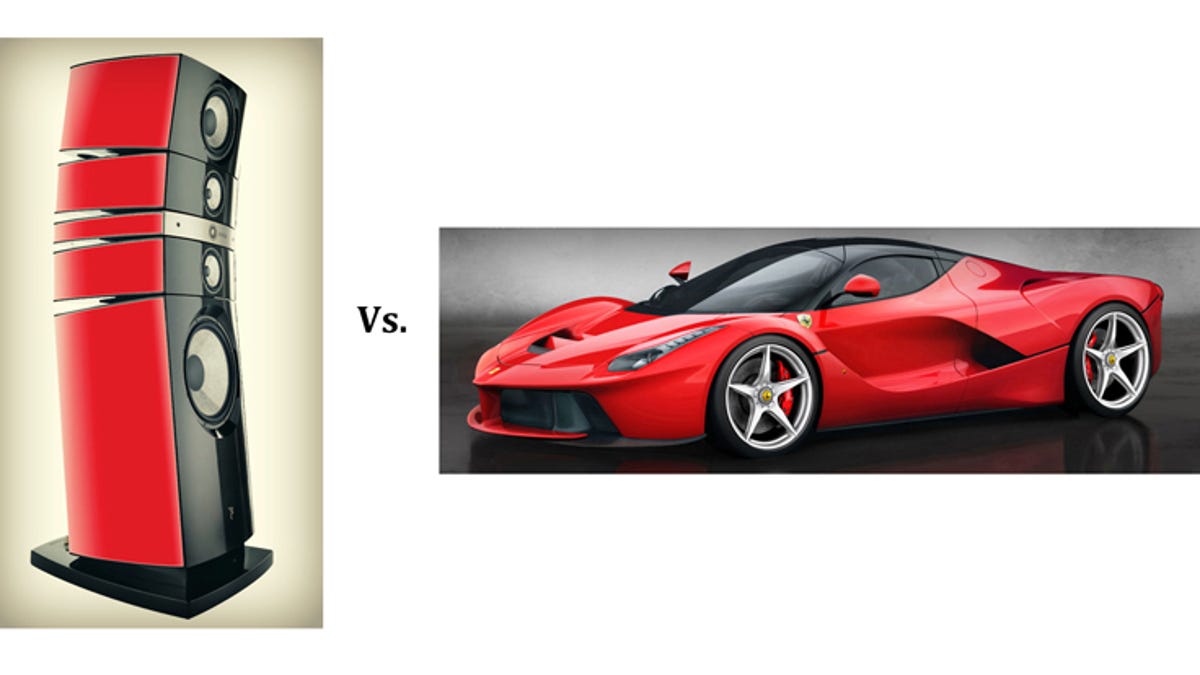What's more 'practical,' a Ferrari or a high-end hi-fi?
Exotic cars are showcases of brute-force technology, but have minimal value as cars; high-end audio systems are considerably more useful, says the Audiophiliac.

Eyeball a car magazine or two on a newsstand and there's a good chance you'll spot a 200-mile-per-hour dream machine gracing the cover. Why not? They're gorgeous weapons of speed, and they all sell for more than the price of your house. Supercar MSRP inflation shows no signs of letting up, all (three) of the $3.9 million, 750-horsepower Lamborghini Venenos are spoken for. Ferraris are priced somewhat more competitively; the legendary Italian maker will soon offer 499 editions of their $1.15 million carbon-fiber-bodied, hybrid V-12/electric LaFerrari, which has 963 horsepower and can reach 217 miles per hour. These cars look fast standing still, and that's a good thing because their owners rarely enjoy them, and don't drive them all that much.
I checked out the used supercar ads in the duPont Registry and noted that most dream machines have fewer than 5,000 miles on their odometers. However, I found a 2002 Aston Martin Vantage Volante with a mere 7,700 miles of road use! That's strange -- how many 10-plus-year-old cars do you see with just 7,700 miles? Top Gear's road tester Jeremy Clarkson has probably spent more time behind the wheels of exotic cars than most people who actually own them!
Stepping down from that exalted plateau, 500-plus horsepower BMWs, Mercedes, and Porches sell in much bigger numbers and are more useful as everyday cars. But come on -- that level of speed potential isn't something that enhances the daily drive more than a similar vehicle with 300 horsepower would. For example, the "basic" 350-horsepower Porsche 911 carries a $84,000 price tag, the 620-horsepower Porsche 911 GT2 RS runs $245,000! It's the same car, it just goes faster. But people aren't buying these cars for transportation, they're buying rolling status symbols, and that's fine with me.
Extreme hi-fis may be crazy expensive, but one thing's for sure, the people who buy them actually enjoy them on a regular basis. I sold high-end audio for 16 years, and I know that the very best gear brings the New York Philharmonic, John Coltrane, or Nirvana to life in ways that no $5,000 or $10,000 hi-fi can. In any case, extreme hi-fi systems are decidedly more practical (and affordable) than buying and maintaining a top of the line BMW or Mercedes.
As I recall from my days as a salesman, the rugs on my customers' living room floors were usually more expensive than their $30,000 speakers, and the paintings on the walls of their homes were considerably more valuable than their electronics. The gear was in line with their lifestyle, and the same could be said about my customers with far more modest high-end systems, they enjoyed having great sound. Some of those customers had wristwatches that cost more than their hi-fis. Well-to-do business people, movie stars, and sports heroes can buy the best of the best stuff.

